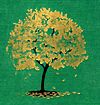...a sacred Other...
...relinquished.
Raintree County, pp. 928-30.
The Perfessor stopped and took a drink.
A faint glare of fire was on the western wall of the night. The
singing from the Revival Tent had lapsed and begun again.
--As
for this god, the Perfessor went on, he has all the characteristics
of a crazy person. He has a god-obsession. He's being constantly
annoyed and persecuted by other imaginary gods that shall not
be had before him. He wants everything to redound to his personal
credit. Nothing for others--but all only for him, so that he
may be glorified forever and forever. He falsifies the history
of the world as an act of self-justification. He wields unlimited
power like a despot and brags of his triumphs. Whatever he wills
is good, and whatever is against his will is evil. He attributes
his own faults to others, attacking Satan for wanting to rule
in heaven and charging the Hebrews for being a stiff-necked people.
Isn't this the picture of a thoroughly unpleasant old man and
a thoroughly unpleasant universe?
--Yes,
it is, Mr. Shawnessy said. But it was better than what went before.
At least the Hebrew God was the product of a strong moral sense.
Later, in the Christian ethic of the Golden Rule, this moral
sense went beyond the tribal stage.
--The
pagans were closer to divinity than Christ was, the Perfessor
said. At least they frankly recognized the miracle of sex and
procreation. They showed a healthy appetite for life itself,
which is more than we can say for the immaculate Nazarene.
--The
pagans recognized the divinity of process, Mr. Shawnessy said,
but not of personality. And as far as I can see, human life is
people. It's even simpler than that. It's Oneself, a simple,
separate person. But Oneself exists by virtue of a world shared
with other selves. Our life is the intersection of the Self with
the Other. In the intense personal form this intersection is
love, and in the ideal, general form it's the Republic. Jesus
gave us the moral shape of this Republic--the Sign of the Cross.
Mr.
Shawnessy heard a commotion in the bushes. The Perfessor's place
on the swing was empty, and the Perfessor's head was just disappearing
over the side of the verandah.
--I'll
be back later, he said. Be good children, and don't eat any apples.
--It's
getting quite dark, Mrs. Brown said, her voice low and musical.
She
sat beside him on the swing, her hair bound up leaving her neck
bare all around in the fashionable way, her hands folded in her
lap, her face and figure in piquant profile.
He
was thinking of her universe. It was, he knew, a rather brave,
hopeful, lovely universe. He understood this universe, liked
it, lingered uneasily at the threshold of it. He was thinking
of the long, long way that had led from female to feminine, from
Woman to Eve. Billions of lost souls had labored to perfect this
slight creature and her universe of feminine values. Two hundred
thousand years had been necessary to tailor her modish dress
out of a figleaf. Billions of dead hands had put stone upon stone
to erect the curious monument of the house. Like a sound of ocean
was the murmur of dead tongues that had struggled to speak so
that her mouth might make musical words about the rights of women
and the finer things of life, so that her bookcase might be full
of gilded volumes. This woman, too, was Eve, a sacred Other.
There was, he knew, a sense in which he approached her through
the precise formulations of her lawn, and as he did so, garden
and house dissolved; pagan adornments were overcome by bark and
leaves. He had entered a grove of danger and decision. There
was a sense in which he found her there, forever waiting, naked,
with gracious loins, an anguishingly beautiful young woman whose
body wore perhaps some curious blemish as a sign of her mortality.
There was a sense in which he was always reaching out his hand
toward her in this place and touching her face as it looked up
into his. There was a sense in which the face was that of the
woman he had married, and also of some other women whose faces
had been turned up toward his. There was a sense in which this
face of the archetypal woman was forbidden, untouchable, divine.
In this excitement, there was a sense in which he became lost:
he lost his name, his selfhood, his oakleaf garland, and even
his own private republic, and achieved a wonderful unity-- which
was immediately relinquished.

| The Novel | Essays | Other Writings | RL Jr. Writer's Award | Complete Contents | Book Orders |
| The Biography | Photos / Postcards | RC Source & Facsimiles | Suicide & Prevention | Movie & Score |